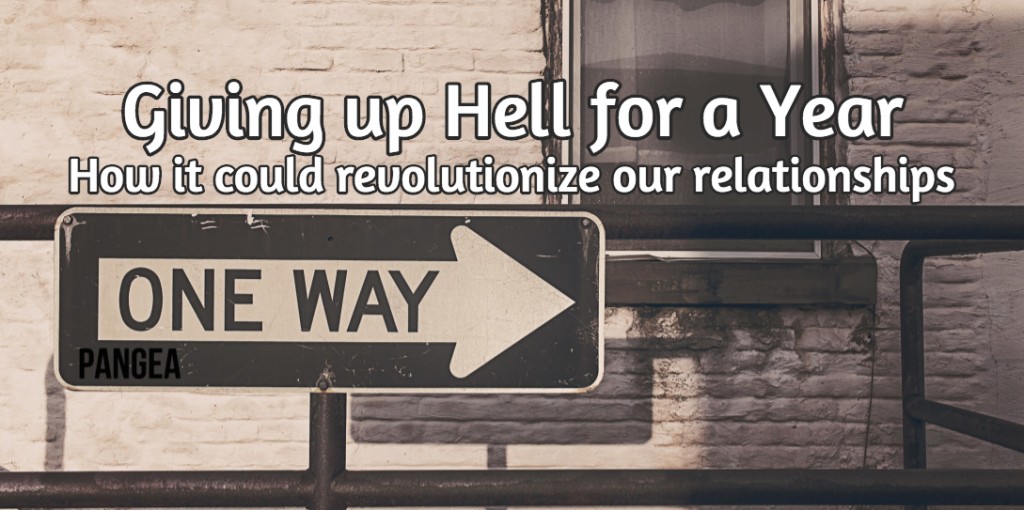I believe in Hell. Hell is real, in one form or another.
Hell on earth is something every human being agrees exists. War tears families apart. Disease kills parents and leaves behind orphans. Famine neglects to feed the most vulnerable. Consumerism by the privileged fuels the ramifications of all of these things. Hell on earth–this is real.
Hell as a literal place of eternal conscious torment for those who never make a mental assent to the Four Spiritual Laws (1. God loves humans, 2. Humans are sinners, 3. Only Jesus saves sinners, 4. Accept Jesus to live eternally) is another perspective. People with this view, which includes most American Christians, have an obligation to tell as many nonbelievers as possible that they need Christ as a means of escape from hell. The God who died to save them is the God who will let them spend eternity in hell if they don’t acknowledge God’s grace. This puts lots of pressure on the faithful. It can at times lead to relational manipulation (more on that point in a moment).
Hell as the reality of eternal death, a non-eternal life, is another perspective. This view, often called annihilationism or conditional immortality holds (in various forms) that at the return of Christ, those who fail to recognized him as Lord and God will literally perish from existence. They will not live in a place called “hell” forever; hell is the judgement of being excluded from the renewed creation. This is because eternal life is a “gift,” in a literal sense, meaning that faith is the condition upon which an individual will live immortally. Those who do not receive the gift of immortality, will eventually cease to exist–mind, body, and soul.
Each perspective is layered with nuances, to be sure. For instance, those who believe in a literal hell vary on whether the “fire” language is also literal or simply an image of suffering. Others holding the conditional immortality view (myself included) disagree as to whether there is a intermediate state of consciousness in a hell-like realm, after death and prior to the final judgement upon Christ’s return.
My current view is that those who die without a connection to Christ are simply dead, without any awareness of any kind (I do believe, however, that those who are “in Christ” are conscious after death in some way–but this need not be true of those who aren’t as these are two different scenarios.). At the final resurrection, my conviction is that all of humanity will be raised from the dead. The purging fires of God’s love will be the means of judgement for everyone. Followers of Jesus will be judged/purged in such a way to be fully prepared for the new creation.
Those who are not followers of Christ will be purged either a) into a final death/destruction or (and what follows is admittedly more speculative) b) into a postmortem relationship with Christ: thus ready to experience Christ’s saving work and the eternal life they neglected during their first life. Not all will chose this as the trajectory of the hearts of many will remain against God’s gracious way, and thus they will be metaphorically burned up into literal nonexistence.*
Any of the above views, mine included, involve a coming judgement–none of which will be pleasant. Certainly, those embracing the eternal torment view have a worse scenario in mind, but even so, all agree that postmortem realities without God aren’t good. My view holds out the possibility of hope for the non-convinced to become convinced in the final resurrection, but that convincing and purging will still be unpleasant at best.
The Problem with Hell
It’s obvious that when Christians contemplate hell, we’ve got a problem.
Hell is awful, in all of its manifestations. This is especially true of eternal conscious torment. Suffering for eternity for deeds done in one lifetime–this is a hard pill to swallow. I don’t think it is the biblical view, but that’s a point for another time. Suffice it to say that a growing number of Christians no longer believe in the so-called “traditional” view of hell.
When it comes to relationships, I’d venture to say that our theology of hell has a profound influence on how we treat people of other faiths. We use language like “win them to Christ” or “relational evangelism.” But here’s the thing, loaded into those phrases is the pressure to “convert” people into a belief system that will help them escape hell.
A subtle thing happens with many Christians who have hell on the brain; we get batshit awkward around people of other faith traditions or of no faith at all. Being actual friends, with no strings attached, is often difficult because of Christian cultural baggage that comes with hell-talk. We get inculcated into a system of fear which leaves us ill-equipped for building real friendships with people who don’t share our convictions. This problem drives some Christians mad as they wait for that perfect moment to whip out a gospel tract as though it were our U.S. Passport at a dangerous foreign checkpoint. Our preoccupation with slipping in the Scriptures and the “ultimate question” makes us into terrible human friends. Friendship should never be motivated solely by agendas.
Hell No(ne)!
For an increasing demographic in the U.S., if we were to ask them to finish the sentence “Religion is ____,” they’d likely answer: “…not something I think about much.”[i] The majority of this religiously unaffiliated 19.6 percent of U.S. citizens considers themselves to be either “a religious person” or “spiritual but not religious.”[ii] This growing portion of the population challenges whether the predicate of “Religion is…” will matter in future generations. This scares many Christians who have hell on the brain.
The dominant religion “nones” (a technical term meaning a person who isn’t affiliated with or currently searching for a formal religion) grew up in proximity to, Christianity, is perceived as obsessed with money, power, rules, and politics.[iii] Most of these unaffiliated persons differ from atheists, but excavate their “spiritual” selves from irrelevant “religion”—a reasonable reaction against prevailing religious narratives labeled “Christian.” When making friends with a none, the temptation for many will be to see them as a means to a “win.” But here’s the problem, they smell the fire and brimstone rescue agenda like putrid burning sulfur from a mile away. And they aren’t interested.
Also, don’t tell these folks: “God loves you but you are a sinner and need to be saved…” Nones don’t care. They are just as nice as many Christians. Shoot, they give to charity; they have integrity in school and work; they stay faithful to their partner or spouse; they have genuine character that causes them to look out for the welfare of others. Telling nones that they need to be saved doesn’t even compute most of the time. Add hell to the picture and it, as you might imagine, creates a laughable scenario. Religion (to many religiously unaffiliated persons) is irrelevant and hell is a silly, archaic, mythic fantasy for people who find comfort in the ill fate of others who happen disagree with key tenets.
Hell Makes Us Terrible Friends
It seems that Christians have a problem, a relationship problem. Many of us don’t know how to relate to those who differ from us. And when Christians try to befriend others, including nones, the pressure of hell looms large. Fear drives some Christians into a socially awkward state that actually renders them ineffective at relating to the very people they feel so compelled to “save.”
A couple of situations emerge as a result. On one end of the spectrum you have those Christian fundamentalists who parade through every major event that comes to downtown. They have signs that says “Jesus loves you–so don’t let him send you to hell!” or “Gays go to hell!” or “Wrath is coming–Jesus saves!” These megaphone preachers only know how to preach one sermon: turn or burn. And if they aren’t holding a megaphone, they have a sign or a tract. Needless to say that these folks turn more people off to God than they “win.” They have zero capacity to have meaningful relationships with nonChristians.
A second scenario involves the person who is so worried about hell that they befriend others with the goal of “saving” them. But again, as we’ve already established, this approach makes friendship superficial. What do nonChristian friends have to offer the Christian with an agenda? Absolutely nothing–but a “win.” And if the “win” doesn’t come, and it looks like it will never come, then it’s time to walk away. Otherwise, the Christian might be influenced badly by the “worldly person.”
Christians usually suck at being good friends when they are preoccupied with hell–that is obvious and uncontroversial by now. This doesn’t mean that it isn’t a reality to be taken seriously (whatever your theological persuasion may be), but that it shouldn’t be the single reason that we try to have friends who don’t share our view. When we do that, we run the risk of becoming shallow friends, which should be the last thing that Christians are known for. Hell can make us terrible friends.
Give It Up
But…
What if we are truly missing something? What if the majority of Christians are actually “losing” as they try to “win” by failing to move to deep places of authenticity with nonChristians?
NonChristians are not objects to be targeted by holy agendas.
NonChristians often look more Christlike than many Christians.
NonChristians are often fun, pleasant people to be around.
NonChristians have several gifts to offer us Jesus people.
NonChristians can shape us positively.
And any Christian can have meaningful relationships with nonChristians, but it might mean giving up hell.
What do I mean exactly? I want to invite readers to contemplate giving up hell for a year. For one year of your life, I’m suggesting that you become a practical universalist (not a theological universalist). Live as though hell doesn’t exist. I dare you. This might transform your posture toward others in beautiful ways.
If every Christian gave up hell for a year, our relationships with nonChristians would be revolutionized. With less reason for agenda, these friendships would become mutually beneficial. We’d laugh. We’d cry. We’d play. We’d serve. We’d be authentic friends.
And here’s the ultimate authenticity test: If we knew that a nonChristian friend would never accept Christ in this life, would we still invest our lives into their flourishing? If not, then we are still allowing hell to dictate how we relate to others.
Without hell–all we have to offer people is heaven. And not some “high apple pie in the sky,” but the reality of God’s love colliding into our world as we become known for hope and healing rather than fear and manipulation. And who knows, it’s possible that some of our new friends will be curious about our faith–as we would be toward their belief system. But engaging with God would no longer be premised on rhetorical coercion, but would be the natural result of them seeing the radical, justice seeking, enemy loving, character transforming, upside-down kingdom of God flowing through our lives.
So, let’s give up hell and discover how our newfound posture revolutionizes our relationships. I might be wrong, but for some, this mental shift might be one of profound liberation. If I’m wrong after a year, there’s always the old way of doing “relationships” to fall back on.
——————————————-
[i]. For examples and commentary, see: James Emery White, The Rise of the Nones: Understanding and Reaching the Religiously Unaffiliated (Grand Rapids: Baker Books, 2014), 26–28.
[ii]. Pew Forum on Religion and Public Life, “Nones” on the Rise, http://www.pewforum.org/2012/10/09/nones-on-the-rise/ (accessed October 4, 2014).
[iii]. Ibid. See also: James Emery White, The Rise of the Nones: Understanding and Reaching the Religiously Unaffiliated, 36-41.
*I discuss this view, which I call Purgatorial Conditionalism, in a series called: Hell Yes. Hell No! Or Who the Hell Cares. My view is firmly in the Conditional Immortality camp, with the hope that some people will come to faith in the resurrection (but this, is of course, speculative–even if the biblical evidence points in a “generous” direction.) My view differs from universalism in many ways, specifically in that God will allow many who reject the work of Christ to finally cease to exist.
















